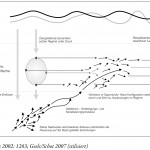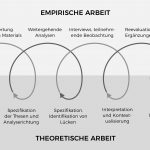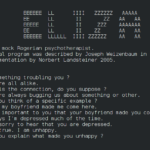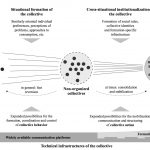17. April 2020
Seit meinem ersten Post zum Thema »Corona-Krise und Soziologie« vor rund einem Monat hat sich nicht nur in der (gesundheits-)politischen, sondern auch in der soziologischen Bearbeitung der Krise viel getan – wie sich unter anderem an den Übersichten von Soziopolis oder der Deutschen Gesellschaft für Soziologie zu krisenbezogenen Eingaben von Soziologinnen und Soziologen ablesen lässt. Den Rat von Jürgen Habermas (FR, 7.4.2020) nehmen sich dabei augenscheinlich nicht alle Gesellschaftsforschenden in ihren Interviews und zeitdiagnostischen Essays zu Herzen:
»Unsere komplexen Gesellschaften begegnen ja ständig großen Unsicherheiten, aber diese treten lokal und ungleichzeitig auf und werden mehr oder weniger unauffällig in dem einen oder anderen Teilsystem der Gesellschaft von den zuständigen Fachleuten abgearbeitet. Demgegenüber verbreitet sich jetzt existentielle Unsicherheit global und gleichzeitig, und zwar in den Köpfen der medial vernetzten Individuen selbst. […] Zudem bezieht sich die Unsicherheit nicht nur auf die Bewältigung der epidemischen Gefahren, sondern auf die völlig unabsehbaren wirtschaftlichen und sozialen Folgen. In dieser Hinsicht – so viel kann man wissen – gibt es, anders als beim Virus, einstweilen keinen Experten, der diese Folgen sicher abschätzen könnte. Die wirtschafts- und sozialwissenschaftlichen Experten sollten sich mit unvorsichtigen Prognosen zurückhalten. Eines kann man sagen: So viel Wissen über unser Nichtwissen und über den Zwang, unter Unsicherheit handeln und leben zu müssen, gab es noch nie.«
Zumindest vorderhand ist diese Zeit der Unsicherheit freilich eine von sich ohnehin in der Öffentlichkeit bewegenden Public Sociologists gerne genutzte Möglichkeit, die Gesellschaft über die Gesellschaft aufzuklären – wenngleich die gegenwärtigen Entwicklungsdynamiken mitunter allzu offenkundig in das eigene analytische Raster gepresst werden. Der (wie stets selektive) Überblick für diese Woche:
Weiterlesen »
11. April 2020
Womöglich wird die Corona-Krise in der Retrospektive als ein beschleunigendes Trägerereignis für die digitale Transformation der Gesellschaft eingestuft werden, so wie es aus Sicht einiger Medienhistoriker die Reformation ab 1517 für den gutenbergschen Buchdruck bzw. die Printmedien war. Der Videochat etwa, an den seit vielen Jahrzehnten hohe (aber unerfüllte) Erwartungen geknüpft wurden, scheint nunmehr in der Mitte der Gesellschaft angekommen zu sein – und mit ihm Plattformen wie Zoom, die sich trotz aller Datenschutzbedenken auch an Hochschulen verbreiten.
Mit der intensivierten Digitalisierung der Lebenswelt gehen indes zahlreiche spürbare Ambivalenzen einher, die derzeit in Echtzeit reflektiert werden. Wie seit einigen Wochen üblich, werden an dieser Stelle einige sozialwissenschaftliche Stimmen aus dem öffentlichen Diskurs hierzu dokumentiert:
Weiterlesen »
4. April 2020
Nachdem letzte Woche die Digitalisierung der Gesellschaft im Zeichen der Corona-Krise im Fokus stand, dokumentiert dieser Beitrag nun sozialwissenschaftliche Diagnosen und Einschätzungen zu der massenmedialen Berichterstattung im Kontext der Pandemie. Denn die zentrale Bedeutung journalistischer Massenmedien in der gesellschaftlichen Gegenwartsbeschreibung, die wiederum Grundlage kollektiv bindender Entscheidungen ist, trat in den letzten Wochen erneut pointiert hervor. Einige auffindbare soziologische bzw. medienwissenschaftliche Stimmen dazu:
Weiterlesen »
28. März 2020
Soziopolis ist nun in die Dokumentation soziologischer Stimmen zur Corona-Krise eingestiegen (u.a. auch auf Grundlage der Sammlung hier). In dieser Übersicht noch nicht reflektiert werden die Eingaben von Hartmut Rosa, der die aktuelle Krise vor allen Dingen auch als Chance zur Entschleunigung und zum Innehalten beschreibt (»Plötzlich guckt man intensiv aus dem Fenster und sieht die ersten Blüten […]«, tagesspiegel) – in Gesprächen aber langsam feststellen muss, dass dies allenfalls für die privilegierten Teile der Bevölkerung mit eigenem Garten und stabilem Einkommen gilt (taz, swr2, sz). Mit Sicherheit werden seine Äußerungen in der nächsten Folge der Soziopolis-Reihe aufgegriffen werden.
Weiterlesen »
20. März 2020
Mit jedem weiteren Tag zeichnet sich immer deutlicher ab: Die Corana-Krise wird das gesellschaftliche, wirtschaftliche und politische bzw. öffentliche und private Leben nicht nur für einige Wochen, sondern für viele Monate und Jahre prägen – und es gehört nicht viel dazu, um vorherzusagen: Das ist ein Einschnitt, an den wir unser ganzes weiteres Leben immer wieder zurückdenken werden. Ich möchte an dieser Stelle wie schon im letzten Post einfach, unkommentiert und naturgemäß selektiv einige Stimmen dazu aus der Soziologie dokumentieren, die in dieser Zeit auch eine seismographische Funktion erfüllt (bzw. einnehmen sollte):
Weiterlesen »
1 Kommentar
15. März 2020
Die Corona-Krise und der aktuelle Shutdown des öffentlichen Lebens bietet eine gute Gelegenheit, über Gesellschaft nachzudenken – nicht nur mit Blick auf die Frage, welches Maß an sozialer Distanzierung die Ausbreitung des Virus’ verlangsamen und so die jeweiligen Gesundheitssysteme entlasten kann (siehe dazu einen Artikel der Washington Post), sondern z.B. auch hinsichtlich der Bedeutung öffentlicher Veranstaltungen und oft als selbstverständlich empfundener Versorgungsstrukturen in der Alltagswelt, der Relevanz journalistischer Nachrichtenmedien, dem Vertrauen in staatliche Strukturen, der Erosion von sozioökonomischer Erwartungssicherheit oder veränderten Formen des (technikvermittelten) sozialen Miteinanders.
Dementsprechend ist die Corona-Krise ein viel diskutiertes Thema auch unter Sozialwissenschaftlerinnen und Sozialwissenschaftlern, wobei sich bislang naturgemäß primär einschlägige Zeit- und Gegenwartsdiagnostiker in die öffentliche Diskussion eingebracht haben. Nachfolgend fünf (zu ergänzende) Beispiele:
Weiterlesen »
23. Februar 2020
Das Programm zur diesjährigen Frühjahrstagung der DGS-Sektion Wissenschafts- und Technikforschung lässt sich nun abrufen (PDF). Am 14. und 15. Mai werden Noortje Marres (Warwick), Johannes Weyer (Dortmund), Dirk Baecker (Witten), Ingo Schulz-Schaeffer (Berlin) und viele weitere Wissenschaftlerinnen und Wissenschaftler in Essen über Theorien, Methoden und Perspektiven der Wissenschafts- und Techniksoziologie in der digitalisierten Gesellschaft diskutieren:
Die gesellschaftliche Differenzierung und der technische Fortschritt sind zentrale Treiber sozialen Wandels und fordern die Wissenschafts- und Techniksoziologie in regelmäßigen Abständen zur Aktualisierung ihrer Theorien und Methoden auf. Zugleich rücken viele dieser soziotechnischen Veränderungsdynamiken in der Wissenschafts- und Technikforschung zu einem deutlich früheren Zeitpunkt in den Blick als auf anderen sozialwissenschaftlichen Feldern. Die Digitalisierung der Gesellschaft als sogenannter Megatrend bietet für die Wissenschafts- und Technikforschung daher nicht nur ein riesiges Reservoir an Themen, sondern zugleich auch eine willkommene Gelegenheit zur Selbstreflexion. Die Frühjahrstagung der DGS-Sektion Wissenschafts- und Technikforschung will dementsprechend genauer eruieren, welche Beiträge für das Verständnis der digi- talen Transformation der Gesellschaft bis dato geleistet worden sind und wo konkrete Forschungslücken liegen.
Zum Programm »














